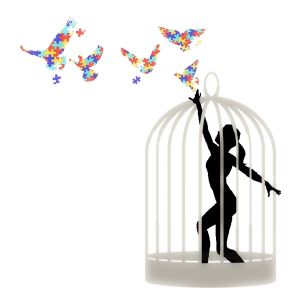
Reaction Formation
Reaction formation is a defense mechanism in which people express the opposite of their true feelings, sometimes to an exaggerated extent. For instance, a man who feels insecure about his masculinity might act overly aggressive. Or a woman with substance use disorder may extol the virtues of abstinence. This dynamic is often summarized by Shakespeare’s famous line in Hamlet: “The lady doth protest too much, methinks.”
The concept of defense mechanisms was developed by Sigmund Freud and his daughter Anna Freud. They conceptualized a spectrum from mature to immature defense mechanisms, on which reaction formation is considered intermediate. Many Freudian theories have been disproven over time, but defense mechanisms like reaction formation have endured.

The counterintuitive tendency to adopt beliefs diametrically opposed to one’s own is driven by a desire to protect the ego—one’s true nature may be deemed unacceptable by the individual, his or her loved ones, or society at large.
For example, a man who desperately craves love but can never seem to develop a relationship may begin to outwardly espouse misogynistic views. By denying his true feelings, he can protect his self-esteem.
Reaction formation may be a temporary coping mechanism, but it’s unproductive in the long run. It ignores underlying beliefs or challenges that need to be addressed, which can hurt mental health.
Reaction formation occurs because an individual is anxious or uncomfortable about a particular belief, trait, or preference. By demonstrating the opposite, that uncomfortable characteristic remains unacknowledged, both to themselves and others. But it’s healthier for people to express their authentic selves, so reaction formation can hurt well-being over time.
If a patient seems to have intense, bold, or exaggerated beliefs about something, this may signal that reaction formation is at play. A therapist might address that by helping the patient to explore and accept the underlying challenge that is causing distress. If a young man insists that he has a perfect relationship with his father, the therapist may help the patient work through a conflict with his father that he is anxious to acknowledge.
Undoing is another defense mechanism that involves thinking or behaving in ways that attempt to negate a previous thought or behavior. For example, an absent father may periodically return to spoil his children, or a woman who throws at a plate at her husband may try to “make it up” to him by smothering him with affection. These actions attempt to make amends and even strike the behavior from the record. While undoing involves, simply put, undoing a behavior in an extreme way, reaction formation involves shifting to an opposite behavior or viewpoint.

Reaction formation can be confusing to identify, because the person is often very insistent about their beliefs. And it’s important to state that most people who are passionate about their beliefs are genuine—trusting the person should be the first response. But there are still instances in which reaction formation occurs in daily life, such as in relationships or politics.
One way reaction formation occurs in relationships is when one person is uncomfortable with their feelings of affection for the other. Instead of embracing the person, reaction formation may lead them to disengage, argue, or hurt the person. This is an adult version of a common childhood dynamic, when teasing, hair-pulling, and other calls for attention may signal that one child has a crush on another.
The tendency to publicly and vehemently protest an uncomfortable desire sometimes manifests in those who struggle with sex or sexuality. For example, there have been examples of politicians who preach against homosexuality yet are gay themselves, and politicians who advocate for legislation against child molestation yet have sexually abused children themselves. Research shows that conflicting moral and religious beliefs about porn may contribute to self-identification as a porn addict. Although there are many contributing factors in these situations, one might be that discomfort with aspects of sex and sexuality leads to reaction formation.
Another example of reaction formation is an angry person who displays exaggerated calm and courtesy. In that case, their anger may come out in other ways such as passive-aggression—back-handed compliments, making tenuous excuses, sowing doubt and confusion, feigning compliance with requests, or shifting blame and responsibility. Since passive-aggression prevents underlying issues from being identified and addressed, it can be very frustrating for people on the receiving end.


![By Max Halberstadt [ Christie's] Public Domain](https://cdn2.psychologytoday.com/assets/styles/manual_crop_3_2_600x400/public/field_blog_entry_teaser_image/2018-05/sigmund_freud_by_max_halberstadt_cropped.jpg?itok=ubxSjnfb)








